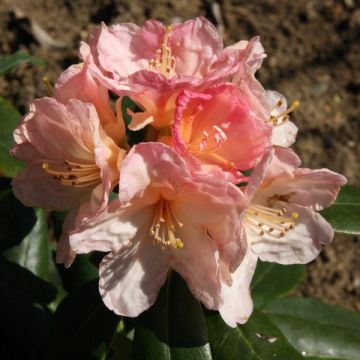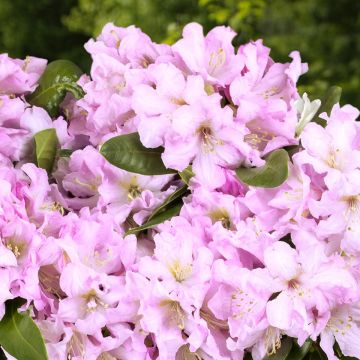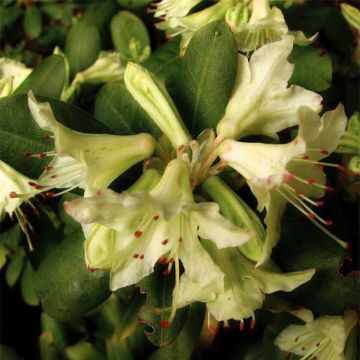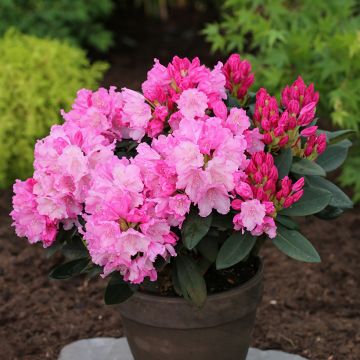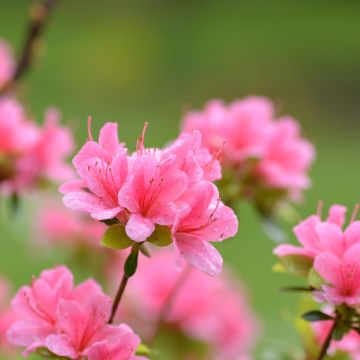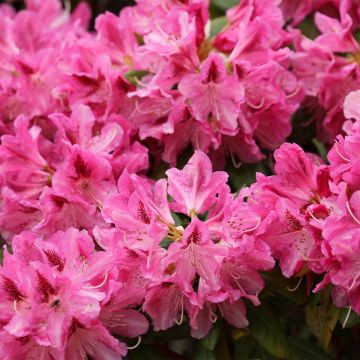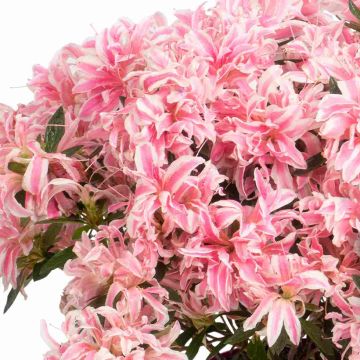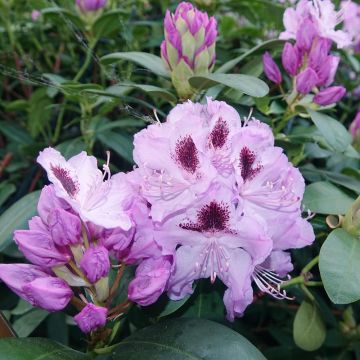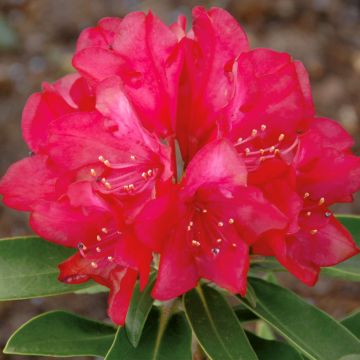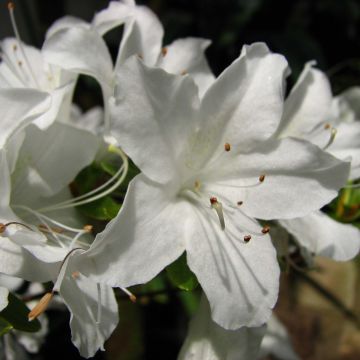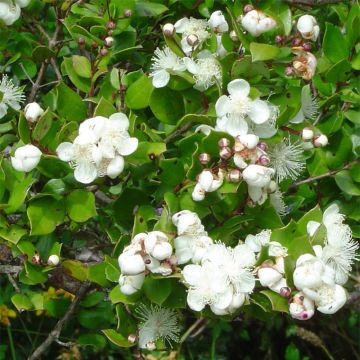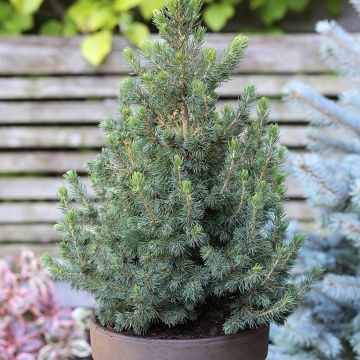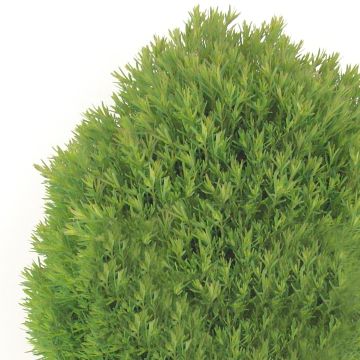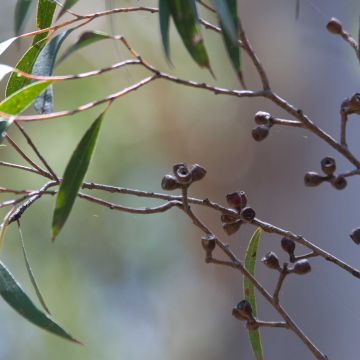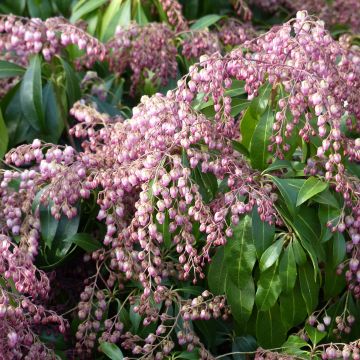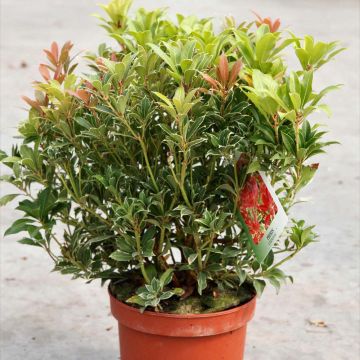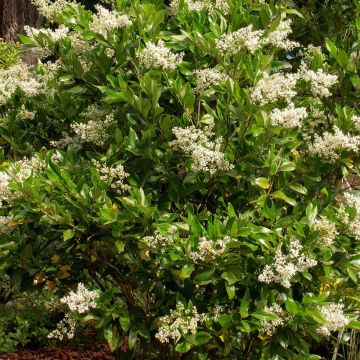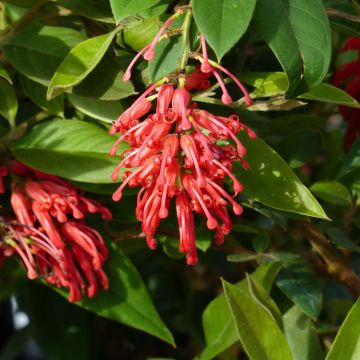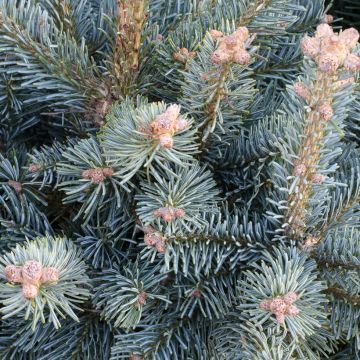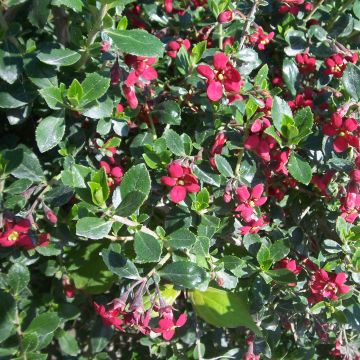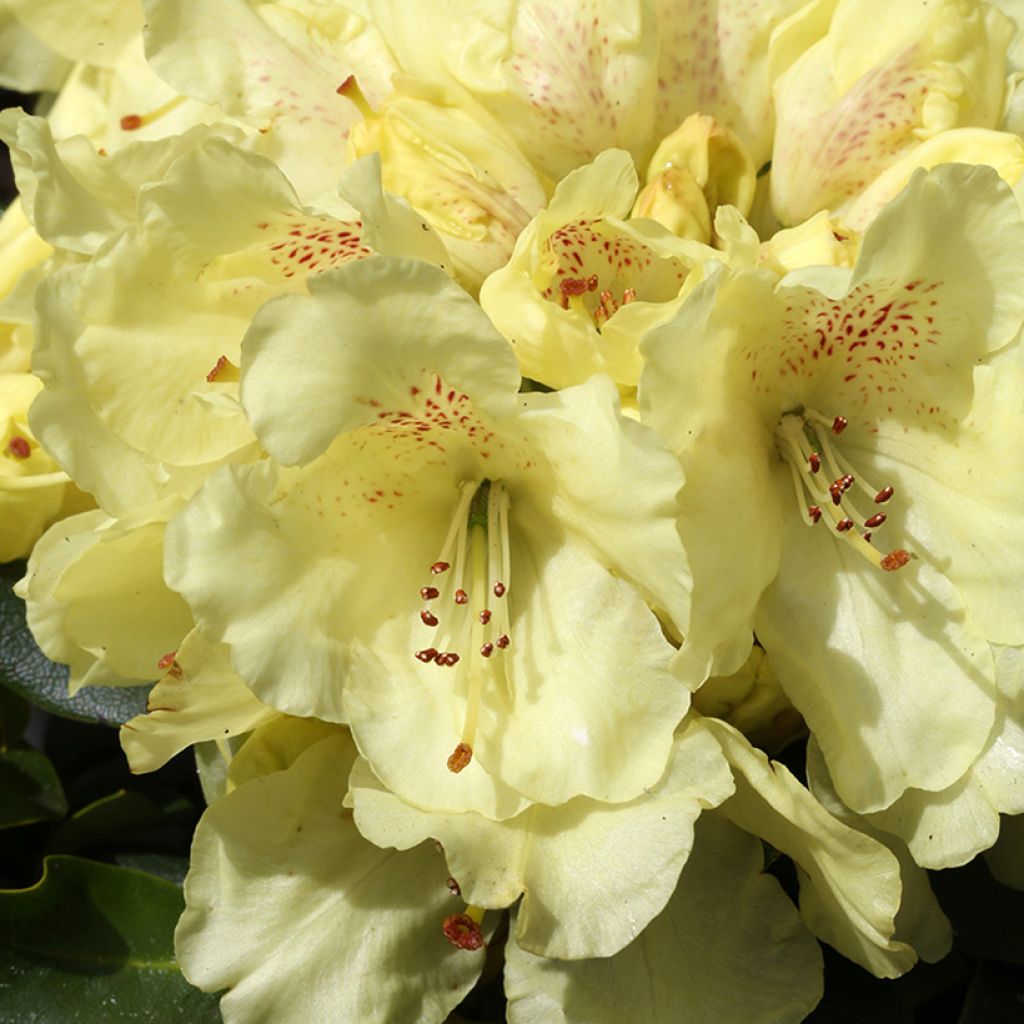

Rhododendron yakushimanum Easydendron Bohlkens Laura
Rhododendron yakushimanum Easydendron Bohlkens Laura
Rhododendron yakushimanum Easydendron® Bohlken's Laura®
Yakushima Rhododendron, Yakushimanum Rhododendron
This item cannot be shipped to the selected country
Delivery charge from €5.90
More information
Schedule delivery date,
and select date in basket
This plant carries a 24 months recovery warranty
More information
We guarantee the quality of our plants for a full growing cycle, and will replace at our expense any plant that fails to recover under normal climatic and planting conditions.
From €5.90 for pickup delivery and €6.90 for home delivery
Express home delivery from €8.90.
Does this plant fit my garden?
Set up your Plantfit profile →
Description
Rhododendron yakushimanum Easydendron Bohlken's Laura is a compact hybrid, appreciated for its flowers of a beautiful pure yellow colour, without markings. Its very abundant flowering is perfectly highlighted by its small shiny dark green leaves. This rhododendron is part of the Inkharo range (Easydendron), which includes hybrids that are more tolerant of limestone and clay in the soil. It forms a bright and floriferous bush, perfect for easily enhancing a small shady or slightly shaded space in the garden, in a wide range of soils.
Rhododendrons encompass over 800 species from the Ericaceae family, cultivated for the beauty of their impressive flowering. The history of the Inkharo Rhododendrons, slightly revolutionary plants recently presented at the Chelsea Flower Show, began in Germany over 20 years ago. The discovery of a rhododendron naturally growing in a chalk quarry made it possible to consider grafting different varieties onto its extraordinary root system. The shrubs obtained by this method tolerate a wide range of soils with a pH ranging from 4.5 to 7.5, provided they are loose, fertile, moist, and not excessively limestone-rich. In summary, any soil that is suitable for hydrangeas. The Rhododendron yakushimanum Bohlken's Laura forms a dense bush with a rounded habit of about 1m (3ft) in height and 1.2m (4ft) in width after 10 years. Its growth is rather slow. Its small evergreen, leathery, shiny dark green leaves are elliptical in shape and cover the plant well. The flowering takes place in May. Grouped in corymbs, the red flower buds open into large funnel-shaped flowers, about 10cm (4in) wide, of a beautifully soft and pure yellow colour, with brown anthers.
Like all yakushimanum hybrids, affectionately nicknamed "yak rhodos" by specialists, the Rhododendron yakushimanum Easydendron Bohlken's Laura is quite hardy. This one is hardy down to -20°C (-4°F). Even though they prefer a semi-shaded exposure, these hybrids tolerate the sun as long as it is not scorching (morning sun) and their base remains moist. With its abundant and vividly coloured flowering, this "rhodo" easily enhances a small, slightly shaded space in the garden, in the company of ferns, blue or variegated hostas, Pieris, Azaleas, and Japanese Maples, or other rhododendrons from the same group to create superb patchworks of textures and colours in spring. Versatile, you can also plant it alongside many other flowering shrubs, not necessarily ericaceous: hydrangeas, mock oranges, Japanese quinces, buddleias, abelias, or autumn camellias. Japanese Anemones Japanese Anemones will also be good companions, as well as bugbanes and foxgloves in woodland areas. Growing in containers requires regular watering.
Report an error about the product description
Rhododendron yakushimanum Easydendron Bohlkens Laura in pictures
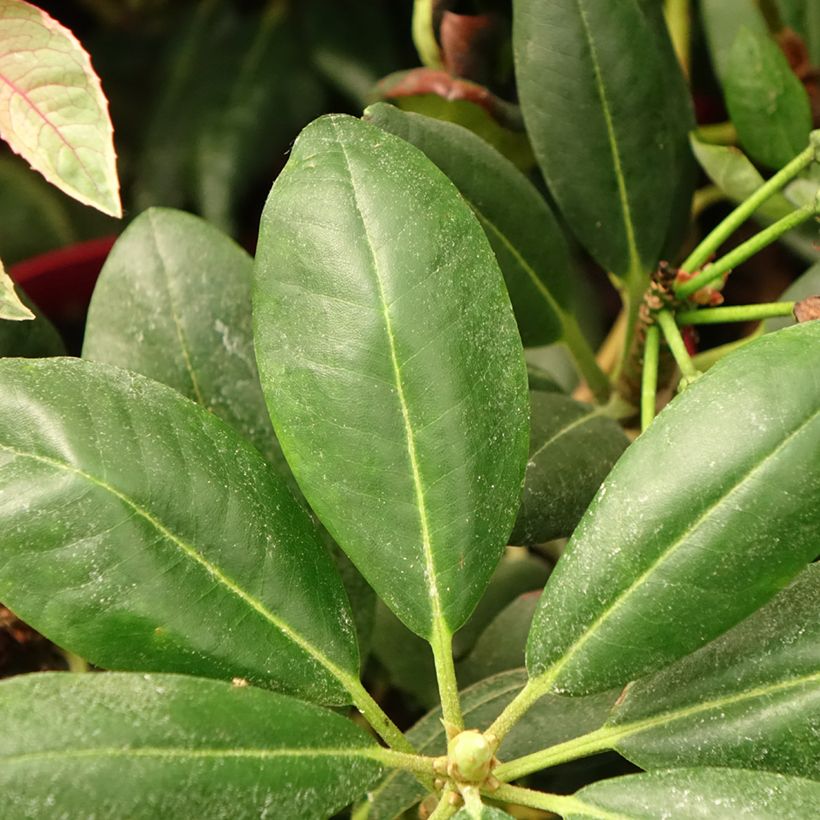

Plant habit
Flowering
Foliage
Botanical data
Rhododendron
yakushimanum
Easydendron® Bohlken's Laura®
Ericaceae
Yakushima Rhododendron, Yakushimanum Rhododendron
Cultivar or hybrid
Other Small Rhododendron
Planting and care
Plant Rhododendron yakushimanum Easydendron Bohlken's Laura in a partially shaded position, protected from cold and drying winds, in moist, loose, fertile soil. It will prefer a slightly alkaline, neutral or acidic soil; any soil which is suitable for a hydrangea. Dig a hole three times larger than the pot. Soak the root ball in water and plant the bush at the collar level, in a nourishing mix composed of leaf compost, gravel or pumice, and loam or topsoil, as Rhodos Inkarho are hungry plants. Water generously and keep the soil moist in summer. Azaleas and Rhododendrons have a relatively shallow root system, so they are sensitive to long periods of drought. Therefore, it is advisable to enrich the soil with humus and water abundantly during dry periods. Apply a layer of wood chips or mulch around the base of the bush every spring to maintain soil moisture and slightly acidic pH. Maintenance consists of removing faded flowers after flowering and removing any dead branches.
Azaleas and Rhododendrons can sometimes be attacked by weevils, which eat the edges of leaves and rootlets, as well as the famous "rhododendron caterpillar," which rarely causes significant damage. There are effective natural solutions against weevils. Yellowing of leaves (chlorosis) in Rhododendrons indicates poor assimilation of iron from the soil and can lead to premature death of the plant. While limestone is often the cause, poorly drained soil or deep planting can also explain the phenomenon.
Planting period
Intended location
Care
This item has not been reviewed yet - be the first to leave a review about it.
Evergreen shrubs
Haven't found what you were looking for?
Hardiness is the lowest winter temperature a plant can endure without suffering serious damage or even dying. However, hardiness is affected by location (a sheltered area, such as a patio), protection (winter cover) and soil type (hardiness is improved by well-drained soil).

Photo Sharing Terms & Conditions
In order to encourage gardeners to interact and share their experiences, Promesse de fleurs offers various media enabling content to be uploaded onto its Site - in particular via the ‘Photo sharing’ module.
The User agrees to refrain from:
- Posting any content that is illegal, prejudicial, insulting, racist, inciteful to hatred, revisionist, contrary to public decency, that infringes on privacy or on the privacy rights of third parties, in particular the publicity rights of persons and goods, intellectual property rights, or the right to privacy.
- Submitting content on behalf of a third party;
- Impersonate the identity of a third party and/or publish any personal information about a third party;
In general, the User undertakes to refrain from any unethical behaviour.
All Content (in particular text, comments, files, images, photos, videos, creative works, etc.), which may be subject to property or intellectual property rights, image or other private rights, shall remain the property of the User, subject to the limited rights granted by the terms of the licence granted by Promesse de fleurs as stated below. Users are at liberty to publish or not to publish such Content on the Site, notably via the ‘Photo Sharing’ facility, and accept that this Content shall be made public and freely accessible, notably on the Internet.
Users further acknowledge, undertake to have ,and guarantee that they hold all necessary rights and permissions to publish such material on the Site, in particular with regard to the legislation in force pertaining to any privacy, property, intellectual property, image, or contractual rights, or rights of any other nature. By publishing such Content on the Site, Users acknowledge accepting full liability as publishers of the Content within the meaning of the law, and grant Promesse de fleurs, free of charge, an inclusive, worldwide licence for the said Content for the entire duration of its publication, including all reproduction, representation, up/downloading, displaying, performing, transmission, and storage rights.
Users also grant permission for their name to be linked to the Content and accept that this link may not always be made available.
By engaging in posting material, Users consent to their Content becoming automatically accessible on the Internet, in particular on other sites and/or blogs and/or web pages of the Promesse de fleurs site, including in particular social pages and the Promesse de fleurs catalogue.
Users may secure the removal of entrusted content free of charge by issuing a simple request via our contact form.
The flowering period indicated on our website applies to countries and regions located in USDA zone 8 (France, the United Kingdom, Ireland, the Netherlands, etc.)
It will vary according to where you live:
- In zones 9 to 10 (Italy, Spain, Greece, etc.), flowering will occur about 2 to 4 weeks earlier.
- In zones 6 to 7 (Germany, Poland, Slovenia, and lower mountainous regions), flowering will be delayed by 2 to 3 weeks.
- In zone 5 (Central Europe, Scandinavia), blooming will be delayed by 3 to 5 weeks.
In temperate climates, pruning of spring-flowering shrubs (forsythia, spireas, etc.) should be done just after flowering.
Pruning of summer-flowering shrubs (Indian Lilac, Perovskia, etc.) can be done in winter or spring.
In cold regions as well as with frost-sensitive plants, avoid pruning too early when severe frosts may still occur.
The planting period indicated on our website applies to countries and regions located in USDA zone 8 (France, United Kingdom, Ireland, Netherlands).
It will vary according to where you live:
- In Mediterranean zones (Marseille, Madrid, Milan, etc.), autumn and winter are the best planting periods.
- In continental zones (Strasbourg, Munich, Vienna, etc.), delay planting by 2 to 3 weeks in spring and bring it forward by 2 to 4 weeks in autumn.
- In mountainous regions (the Alps, Pyrenees, Carpathians, etc.), it is best to plant in late spring (May-June) or late summer (August-September).
The harvesting period indicated on our website applies to countries and regions in USDA zone 8 (France, England, Ireland, the Netherlands).
In colder areas (Scandinavia, Poland, Austria...) fruit and vegetable harvests are likely to be delayed by 3-4 weeks.
In warmer areas (Italy, Spain, Greece, etc.), harvesting will probably take place earlier, depending on weather conditions.
The sowing periods indicated on our website apply to countries and regions within USDA Zone 8 (France, UK, Ireland, Netherlands).
In colder areas (Scandinavia, Poland, Austria...), delay any outdoor sowing by 3-4 weeks, or sow under glass.
In warmer climes (Italy, Spain, Greece, etc.), bring outdoor sowing forward by a few weeks.

































